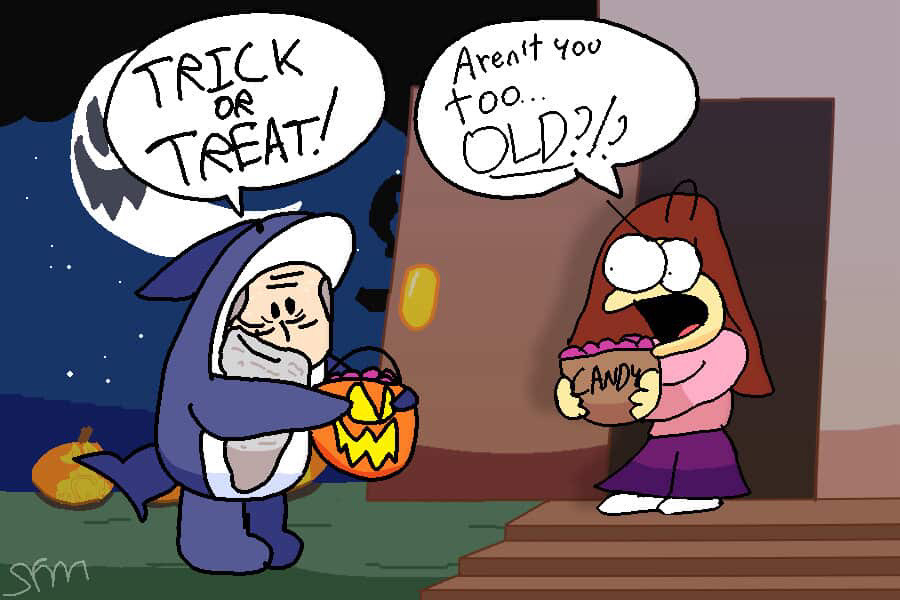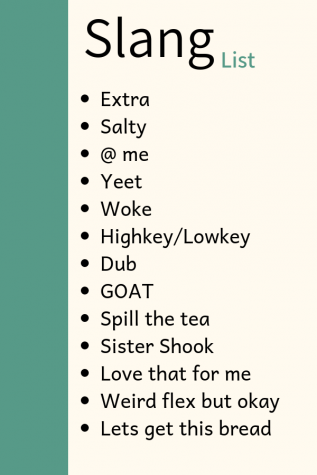Student Slang Showdown
Teachers “Spill the Tea” on Student Slang
Nithila Ilangovan and Jordan Deyo
Candidly thinking, teachers take a moment to compile their own definition for various student slang terms.
November 30, 2018
Within their classes and while walking through the halls of the high school, teachers are exposed to teen slang on a daily basis. To find out how well they have been listening and if they really know how to use teen slang, members of The Wolfpack put teachers to the test.
After giving them a vague warning, staffers visited six teachers on Nov. 12 and 14: Jennifer Fortenberry, Josh Marsh, Adam Babich, Christopher Cieri, Carlos Montoya and Ryan Rodriguez.
•Teachers were given a series of words or phrases to define. If the teacher was unable to do so, he/she could call on a student to use the slang in a sentence. The teacher then got another turn to try it or get more examples, if all else failed The staff explained the meaning.
•After around 6-7 slang words, the final challenge for the teacher was to use as many words he/she learned in a sentence. Later on, they were asked how they felt after learning everything and students’ usage of slang.
The game started off “easy,” using the phrase “spill the tea,” which the majority of the teachers were able to figure out using context from students. Marsh was basically spot on with the meaning of the phrase.
“Maybe telling someone a lie or secret you’re not supposed to,” Marsh said.
Similarly, the term “salty” turned out to be a teacher strong suit, with Montoya having a particularly uncommon way of describing the meaning of it.
“When somebody is angry or being a sourpuss,” said Montoya.
Although “spill the tea” and “salty” were quite accurately interpreted by the teachers, none of them defined the term “flex,” which means to show off, the way students would. Montoya said that he thought it had something to do with trash talking and Marsh evidently had a different answer.
“Flex your muscles and basically act like you’re stronger than you truly are,” Marsh said.
The students then helped him out, saying he always flexes on them with his historical knowledge. However, this did not end up helping him because he then thought flex meant “to give information.”
While “flex” can be used on its own, there is also the phrase “weird flex but okay,” which was tested on Cieri.
“If you talk about something you did that you think is good, but really not,” Cieri said.
The student audience did not think that was correct, leading to senior Eric Nunnelle providing an example of the phrase being used.
“Every single week in the student section, I go and I play the drum solo and drop my stick at the end,” Nunelle said. “Weird flex but okay,” Cieri responded, as he made sense of the usage.
Despite the laugh the teachers got for trying out student slang, Marsh said it can be useful for teachers to be aware of students’ word usage.
“As a teacher, I think it’s good that if a kid is using something like a slang term, you should be aware of it so they aren’t saying something poor about you,” Marsh said. “Also as a teacher, you hear them so often used it becomes a commonplace to you in that regard.”
While Babich also said knowing slang helps teachers pick up on conversations in class, he said that it builds a better teacher to student connection and helps to understand student culture.
“If you know the student and take an active role in learning about their culture and what’s important to them, they’re going to respond a lot better,” Babich said. “It shows them you’re taking an interest in what’s going on in their life and that is really important for kids”.






![Senior Jett Mckinney stores all the clothes in his own room, with half of it stored in his closet along with his personal clothes, and the rest taking up space in his room.
“There’s been times [when] there’s so much clothing stored here and it gets overwhelming, so I end up having to sleep somewhere else in the house,” Mckinney said.](https://cphswolfpack.com/wp-content/uploads/2025/11/DSC_0951-1200x800.jpg)



![Broadcast, yearbook and newspaper combined for 66 Interscholastic League Press Conference awards this year. Yearbook won 43, newspaper won 14 and broadcast took home nine. “I think [the ILPC awards] are a great way to give the kids some acknowledgement for all of their hard work,” newspaper and yearbook adviser Paige Hert said. “They typically spend the year covering everyone else’s big moments, so it’s really cool for them to be celebrated so many times and in so many different ways.”](https://cphswolfpack.com/wp-content/uploads/2025/05/edited-ILPC.jpg)




![Looking down at his racket, junior Hasun Nguyen hits the green tennis ball. Hasun has played tennis since he was 9 years old, and he is on the varsity team. "I feel like it’s not really appreciated in America as much, but [tennis] is a really competitive and mentally challenging sport,” Nguyen said. “I’m really level-headed and can keep my cool during a match, and that helps me play a bit better under pressure.” Photo by Kyra Cox](https://cphswolfpack.com/wp-content/uploads/2025/09/hasun.jpg)

![Bringing her arm over her head and taking a quick breath, junior Lauren Lucas swims the final laps of the 500 freestyle at the regionals swimming competition on date. Lucas broke the school’s 18-year-old record for the 500 freestyle at regionals and again at state with a time of 4:58.63. “I’d had my eye on that 500 record since my freshman year, so I was really excited to see if I could get it at regionals or districts,” Lucas said. “ State is always a really fun experience and medaling for the first time was really great. It was a very very tight race, [so] I was a bit surprised [that I medaled]. [There were] a lot of fast girls at the meet in general, [and] it was like a dogfight back and forth, back and forth.” Photo by Kaydence Wilkinson](https://cphswolfpack.com/wp-content/uploads/2025/03/Kaydence-2.7-23-edit-2.jpg)


![As her hair blows in the wind, senior Brianna Grandow runs the varsity girls 5K at the cross country district meet last Thursday. Grandow finished fourth in the event and led the varsity girls to regionals with a third place placement as a team. “I’m very excited [to go to regionals],” Grandow said. “I’m excited to race in Corpus Christi, and we get to go to the beach, so that’s really awesome.” Photo by Addison Bruce](https://cphswolfpack.com/wp-content/uploads/2025/10/brianna.jpg)



















![Holding a microphone, baseball booster club president Chris Cuevas announces the beginning of the annual cornhole tournament. The event has been held for the past two years and is designed to raise money for the baseball program in a fun way. “We’re a baseball team, so people love to compete,” Cuevas said. “So we figured we better do something that gets [their] attention. They want to compete. It’s not a hard sport to do, and we have all different [skill] levels [of participants].” Photo by Henry Mueller](https://cphswolfpack.com/wp-content/uploads/2025/11/Henry-715-1200x900.jpg)


















